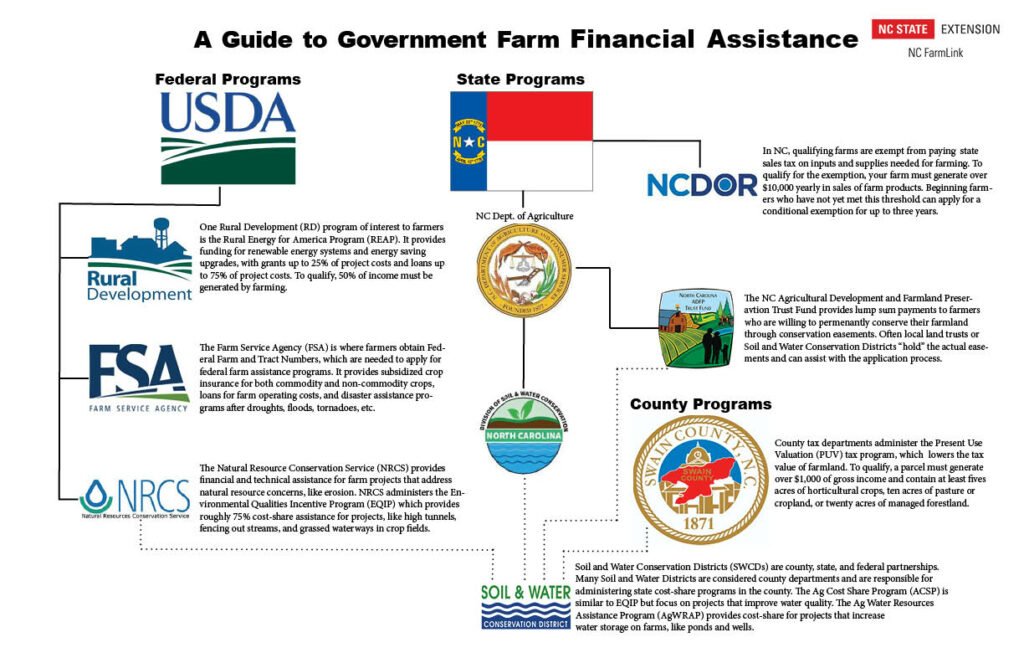Government Funds for Farming Resource Page
go.ncsu.edu/readext?878131
en Español / em Português
El inglés es el idioma de control de esta página. En la medida en que haya algún conflicto entre la traducción al inglés y la traducción, el inglés prevalece.
Al hacer clic en el enlace de traducción se activa un servicio de traducción gratuito para convertir la página al español. Al igual que con cualquier traducción por Internet, la conversión no es sensible al contexto y puede que no traduzca el texto en su significado original. NC State Extension no garantiza la exactitud del texto traducido. Por favor, tenga en cuenta que algunas aplicaciones y/o servicios pueden no funcionar como se espera cuando se traducen.
Português
Inglês é o idioma de controle desta página. Na medida que haja algum conflito entre o texto original em Inglês e a tradução, o Inglês prevalece.
Ao clicar no link de tradução, um serviço gratuito de tradução será ativado para converter a página para o Português. Como em qualquer tradução pela internet, a conversão não é sensivel ao contexto e pode não ocorrer a tradução para o significado orginal. O serviço de Extensão da Carolina do Norte (NC State Extension) não garante a exatidão do texto traduzido. Por favor, observe que algumas funções ou serviços podem não funcionar como esperado após a tradução.
English
English is the controlling language of this page. To the extent there is any conflict between the English text and the translation, English controls.
Clicking on the translation link activates a free translation service to convert the page to Spanish. As with any Internet translation, the conversion is not context-sensitive and may not translate the text to its original meaning. NC State Extension does not guarantee the accuracy of the translated text. Please note that some applications and/or services may not function as expected when translated.
Collapse ▲The list below contains a variety of different government programs that can assist or benefit farmers financially. Beneath the list, there is also a downloadable “quick-guide” to government financial assistance programs.
Tax Programs
The Present Use Value Program: The present use program offers farmers and landowners a significant tax saving on property taxes for farmland. Instead of being taxed at fair market value, the land is taxed at a much lower agricultural value. To qualify, a landowner must have at least five acres of horticultural crops, ten acres of pasture or cropland, or 20 acres of forestland. In addition, for horticultural, pasture, and cropland each parcel must generate at least $1000 in yearly gross revenue from ag use. For forestland, the landowner must have an approved forest management plan. Be aware: this is considered a tax deferral program, so if the property is no longer farmed and removed from the program, landowners are responsible for paying up to three years of back property taxes. For more information, please contact your local county tax assessor.
Farm Sales Tax Exemption: The program exempts farmers from paying state sales tax on farm supplies and equipment. To qualify, farms must generate over $10,000 in yearly revenue. Beginning farms who do not meet the $10,000 threshold can apply for a conditional exemption, at which point they would have three years to meet the $10,000 yearly threshold. For more information, please visit the NC Department of Revenue webpage.
Conservation Cost-share Programs
The Environmental Quality Incentives Program (EQIP): This is a federal program through the Natural Resources Conservation Service (NRCS). It reimburses farmers roughly 75% of costs for a wide variety of best management practices that improve natural resource concerns, like grassed waterways, stream exclusion fencing, and cover crops. To apply for this program, please contact your local NRCS office.
Ag Cost Share Program (ACSP): This is a state program that is very similar to EQIP. However, the primary focus of this program is on practices that improve water quality. Like EQIP, ACSP also reimburses roughly 75% of the costs for installing a practice. This program is administered by your local Soil and Water Conservation District.
Agricultural Water Resources Program (AgWRAP): This state program partially reimburses farmers for practices that increase on farm water storage capacity, like ponds and wells. Ponds and wells must be used for agricultural purposes. To learn more about this program, please contact your local Soil and Water Conservation District.
Rural Energy Assistance Programs (REAP): This federal program through Rural Development pays farmers 25% of cost to install renewable energy systems, including solar panels for on farm energy use. To learn more, please contact your local Rural Development Office.
Farm Service Agency (FSA) Programs: The Farm Service Agency has a wide variety of loan, insurance, and disaster assistance programs. Due to the number of different programs, it’s best if farmers contact their local FSA office to inquire about programs that could fit their particular situation. The FSA office is also where farmers receive farm and tract numbers, which are often required to apply for federal farm assistance programs.
Easement Programs
NC Agricultural Development and Farmland Preservation Trust Fund (NC ADFP): Conservation easements are becoming a popular tool for farmland preservation. Basically, farmers sell the development rights of their farmland to a land trust, which monitors and ensures the property remains as farmland in the future. Conservation easements are legally binding agreements. In NC, the NC ADFP pays farmers for permanent easements. For more information, please contact your local land trust or the NC ADFP office.
Conservation Reserve Enhancement Program (CREP): This state program provides annual payments for farmers who put their streams or wetland areas into conservation easements. Easements range from 10-years to permanent contracts, with bigger payments allocated to longer contacts. Currently, this program is only available in the piedmont and eastern part of the state. For more info on this program, please contact your local soil and water conservation district.
Guide to Government Farm Programs
To downland a pdf of the following resource, please click here: GovProgramsFinished2



